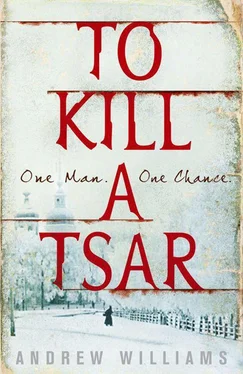It was only a short cab ride from Dr Frederick Hadfield’s apartment to his uncle’s house, and an even shorter journey by boat, but neither could be hired for love nor money. The morning after the attempt on the tsar’s life the city was paralysed by police patrols. From the end of the street he could see the gendarmes stopping traffic on the bridges across the Neva. He had been woken by shouted orders and the clatter of their boots and weapons in the street. The city’s university and many of its best academies were a short distance from his home and, as every Class 14 clerk in the police department knew, places of learning were full of dangerous radicals. Students and intellectuals and foreigners had lived in Vasilievsky Island’s numbered streets or lines since the days of Peter the Great. Hadfield considered himself to be fortunate to have joined them at a reasonable rent in one of the smarter lines at the eastern end of the island. Line 7 was bohemian but not enough to frighten his wealthier patients or excite the opprobrium of his family.
His uncle’s large town house was on the south bank of the Neva, almost directly opposite the end of his line. It had been home to four generations of the Glen family; Hadfield’s mother was born in a bedroom on the second floor. Older and less fashionable than the houses at the other end of the English Embankment, it was still one of the most desirable addresses in the city. Anglo-Russians had lived on the embankment for more than a hundred and fifty years. The Cazalets were at Number 6, Clarke the grain merchant at 38, the Warres at 44, and the physician to three tsars, Sir James Wylie, had once lived at Number 74, his old blue and white mansion one of the most prominent on the river. Hadfield claimed Wylie as family on his father’s side, and his mother’s people were still pillars of this little community. There were two types of Englishmen in St Petersburg: the old families who spoke the language and lived and worked among the Russians all their lives, and the new families who mixed only with their own kind. Embankment families belonged to the former.
On the Nikolaevsky Bridge, Hadfield managed to hail a droshky, only for it to be stopped by blue-coated gendarmes before it had travelled a hundred yards. The young officer in charge eyed him suspiciously and demanded proof of his identity. Hadfield’s Russian was good but he was young, a foreigner and flamboyantly dressed for a city where almost all the best doctors were sober-suited Germans. Beneath his heavy black coat with its fur collar he was wearing a brown tweed suit with a high-buttoned waistcoat and a raffish blue Ascot tie in an extravagant soft bow. He was twenty-seven years old, tall — a little over six feet — with fine, regular features, warm hazel eyes, a neat closely cropped beard and light auburn hair — the gendarme officer would have described it as ‘radical’ shoulder length — and instead of sweeping it back carefully it flopped across his forehead in an unruly fringe. His younger female patients considered him handsome, the older ladies charming, but it was a charm that was lost on the gendarmes. Hadfield need only have mentioned his uncle’s name and he would have been allowed to pass without question, but in the weeks since his return to the city he had been careful not to exploit his connection. It was ten minutes before the officer in charge was satisfied enough with Hadfield’s papers to let the cab pass.
At the end of the bridge the driver turned right on to the embankment and a moment later pulled up in front of the yellow and white building that served discreetly as the English Church. Hadfield paid the driver and walked on a little further. Five doors down from the church stood Baron Stieglitz’s recently refurbished mansion — the grandest at the west end of the embankment — and in its long shadow, Number 70 — General Glen’s home.
A footman in an old-fashioned uniform coat answered the door. Alexei Petrov had served the general in the army and then the family for more than thirty years.
‘Your Honour.’ He bowed his grey head respectfully.
‘Are you well, Alexei?’
‘Yes, Your Honour. And your mother, is she well?’
‘Yes. Thank you. Quite well.’
The old man led Hadfield up the white marble stair with its fine wrought iron filigreed banister to the first floor and knocked politely on the polished mahogany doors. They opened at once, throwing the startled servant off balance.
‘Frederick!’
Alexandra Glen ran forward to kiss her cousin on the cheek: ‘Why are you so late? Father was very grumpy.’ She pouted at him flirtatiously.
‘I’m sorry. I had to walk.’ He smiled at her.
‘You should have walked a little quicker.’
She took him by the hand and led him into the drawing room. His Aunt Mary was sitting ramrod straight on a plum velvet sofa beneath a picture of the Holy Family, severe in a black woollen dress, her grey hair gathered tightly in a bun. She greeted him with a warm smile and stretched her hands out to him. He held them for a moment and bent to kiss her cheeks.
‘How lovely to see you, Frederick,’ she said in Russian. ‘And you look so well. I’m afraid you’ve missed your uncle. He was called to his ministry. This terrible business…’
‘Has something…’
‘Frederick! Are you the only man in the empire who hasn’t heard of the attempt on the life of His Majesty?’
‘I was almost arrested for the crime a few minutes ago, Aunt.’ Alexandra laughed and pushed his arm playfully: ‘I told you, Mother, Frederick is a dangerous revolutionary. He was a student in Switzerland — Father says that’s where all the worst ones live. There — I’ve found you out, Freddie!’
‘Really, darling, that isn’t funny,’ said his aunt. ‘Frederick?’ She inclined her head to indicate he should sit beside her.
Mary Glen was in her early fifties, small and plain with a long oval face and thin lips unkindly scored by age. On first impression it would have been easy to take her for a dour Scottish minister’s wife but she was a bright, good humoured woman with an infectious laugh and a Presbyterian contempt for airs and graces. General Glen had met and married her on a visit to Fife thirty years before and he had chosen wisely. From the first she had thrown herself into her husband’s life, spoke faultless Russian and to the family made a point of speaking nothing else. Her daughter Alexandra was an only child, eighteen now and as petite and pretty as her mother was plain, with the fine features of the Glen family, green eyes and auburn hair. Hadfield was very fond of both of them, the more so because his warmth was so openly reciprocated.
‘Your uncle says there are to be new security measures. Military governors, something close to martial law.’ Mary Glen shook her head. ‘We’re all going to be inconvenienced because one or two madmen want to kill the emperor. What on earth are they hoping to achieve?’
Hadfield frowned and dropped his head a little in a polite show of incomprehension.
‘But tell us of your visit to the south,’ she continued after a moment. ‘We were so frightened something would happen to you.’
‘As you see,’ he said, stretching his arms wide, ‘I’m in rude health.’
Hadfield had returned to Russia only a few months before and on an impulse answered a national call for doctors to prevent the spread of an old contagion. No one in the capital believed the reports from Astrakhan at first. Was it possible that such a thing could happen in a time of progress? But Hadfield had seen it with his own eyes. Hundreds of men, women and children dying of plague, and more had been driven from their villages by the army in a desperate effort to prevent the spread of the disease. There in his uncle’s drawing room, beneath a glittering chandelier, the walls papered in red silk damask, the furniture rich velvet, he spoke of what he had seen, of fires at dusk, smoke spiralling in thin columns against an indigo sky as homes and barns were put to the torch.
Читать дальше












